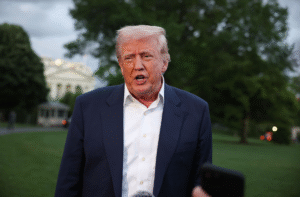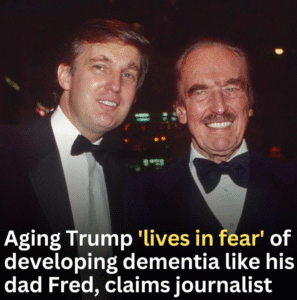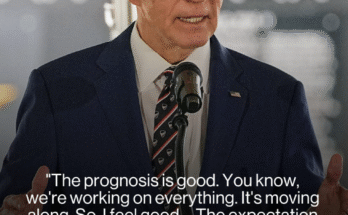
Trump’s Fear of Dementia: Haunted by His Father’s Fate
Though known for his bravado and public defiance, those close to Donald Trump have long whispered about one private fear that looms large in his life: the fear of dementia. This deeply personal anxiety, rarely acknowledged publicly, stems from a source close to home—his father, Fred Trump, who suffered from Alzheimer’s disease in the final years of his life. Watching his once-powerful father deteriorate left a lasting impression on Donald Trump, fueling a quiet but persistent dread of falling victim to the same fate.
Fred Trump, a successful real estate mogul in New York, was a commanding figure in Donald’s life. But in the 1990s, Fred began showing signs of Alzheimer’s. The disease stripped him of his memory, his sharpness, and ultimately his identity. For a man like Donald Trump—who values control, dominance, and image above all else—witnessing his father’s cognitive decline was terrifying. Those who have known Trump for decades say it deeply unsettled him. It was a stark, unflinching reminder that no amount of power or wealth can shield one from the ravages of the human brain.
Behind closed doors, Trump has been described as obsessively attentive to any sign of mental slip-ups. Some insiders claim he repeatedly asks for reassurance about his mental sharpness, and bristles at any suggestion that his cognition may be declining. His adversaries, especially in the political arena, have weaponized this vulnerability, publicly questioning his memory, speech patterns, and decision-making. Such criticisms seem to strike a nerve more deeply than other attacks—likely because they echo a fear he already harbors.
In recent years, clips of Trump appearing to slur words, wander off-topic, or misstate basic facts have gone viral. While his supporters dismiss these moments as harmless gaffes or symptoms of fatigue, others see signs of decline. Trump, ever aware of optics, reportedly lashes out at staff or advisors when such moments receive media attention. To him, the perception of mental weakness is more threatening than any policy critique or legal challenge—it touches the core of what he fears becoming.
Adding another layer of complexity is Trump’s advanced age. Now approaching 80, he is among the oldest political figures in American history to seek or hold the presidency. As scrutiny increases, so too does the pressure to demonstrate mental acuity. Trump has repeatedly boasted about acing cognitive tests, pointing to his ability to “remember five words” or repeat sequences as proof of mental fitness. But critics argue that such tests are meant to detect serious impairment—not to confirm superior intellect.
Ultimately, Donald Trump’s fear of dementia isn’t just about memory loss—it’s about losing control, status, and the persona he’s spent his entire life cultivating. Watching his father fade into the shadows of Alzheimer’s left a mark he can’t erase. And while he may never admit it publicly, that fear continues to chase him, even as he projects strength and certainty on the world stage.
Trump’s Fear of Dementia: Haunted by His Father’s Fate
Though known for his bravado and public defiance, those close to Donald Trump have long whispered about one private fear that looms large in his life: the fear of dementia. This deeply personal anxiety, rarely acknowledged publicly, stems from a source close to home—his father, Fred Trump, who suffered from Alzheimer’s disease in the final years of his life. Watching his once-powerful father deteriorate left a lasting impression on Donald Trump, fueling a quiet but persistent dread of falling victim to the same fate.
Fred Trump, a successful real estate mogul in New York, was a commanding figure in Donald’s life. But in the 1990s, Fred began showing signs of Alzheimer’s. The disease stripped him of his memory, his sharpness, and ultimately his identity. For a man like Donald Trump—who values control, dominance, and image above all else—witnessing his father’s cognitive decline was terrifying. Those who have known Trump for decades say it deeply unsettled him. It was a stark, unflinching reminder that no amount of power or wealth can shield one from the ravages of the human brain.
Behind closed doors, Trump has been described as obsessively attentive to any sign of mental slip-ups. Some insiders claim he repeatedly asks for reassurance about his mental sharpness, and bristles at any suggestion that his cognition may be declining. His adversaries, especially in the political arena, have weaponized this vulnerability, publicly questioning his memory, speech patterns, and decision-making. Such criticisms seem to strike a nerve more deeply than other attacks—likely because they echo a fear he already harbors.
In recent years, clips of Trump appearing to slur words, wander off-topic, or misstate basic facts have gone viral. While his supporters dismiss these moments as harmless gaffes or symptoms of fatigue, others see signs of decline. Trump, ever aware of optics, reportedly lashes out at staff or advisors when such moments receive media attention. To him, the perception of mental weakness is more threatening than any policy critique or legal challenge—it touches the core of what he fears becoming.
Adding another layer of complexity is Trump’s advanced age. Now approaching 80, he is among the oldest political figures in American history to seek or hold the presidency. As scrutiny increases, so too does the pressure to demonstrate mental acuity. Trump has repeatedly boasted about acing cognitive tests, pointing to his ability to “remember five words” or repeat sequences as proof of mental fitness. But critics argue that such tests are meant to detect serious impairment—not to confirm superior intellect.
Ultimately, Donald Trump’s fear of dementia isn’t just about memory loss—it’s about losing control, status, and the persona he’s spent his entire life cultivating. Watching his father fade into the shadows of Alzheimer’s left a mark he can’t erase. And while he may never admit it publicly, that fear continues to chase him, even as he projects strength and certainty on the world stage.
